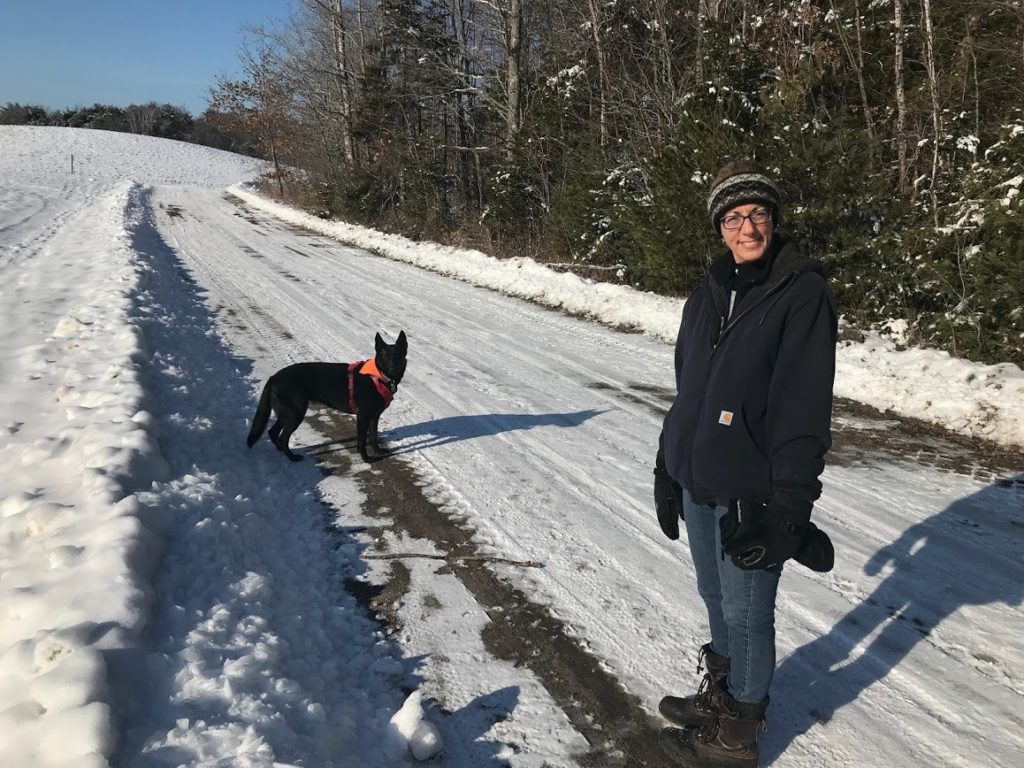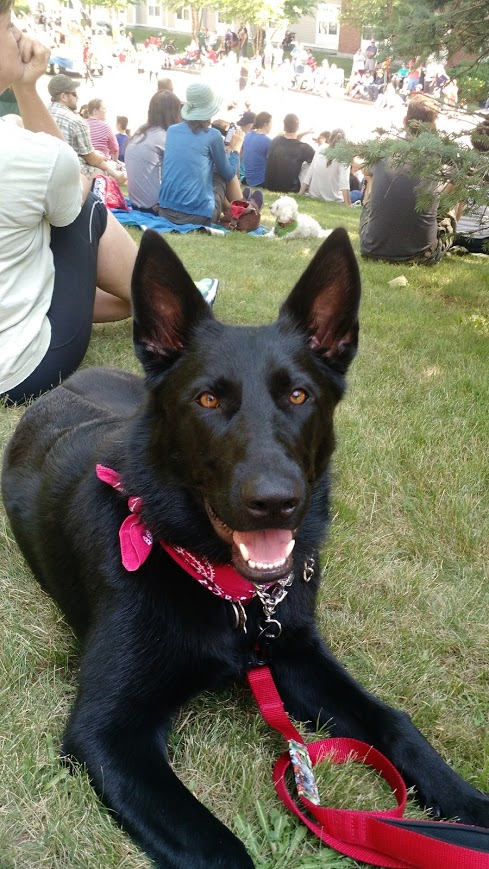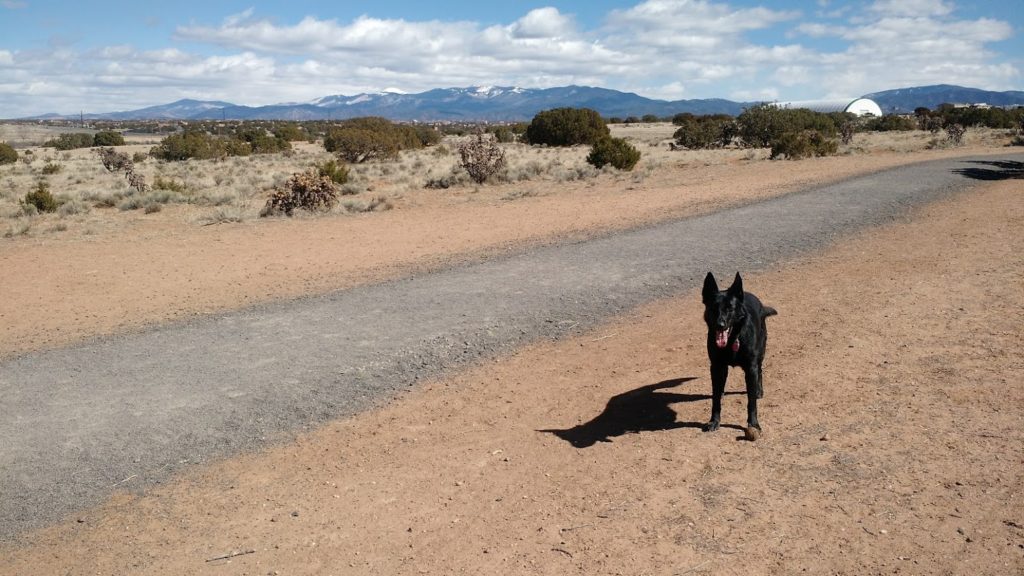Extraction
By Paulla Rich Estes
Unlatching Dinah’s red leash, I follow her along the chain-link fence that wraps a rectangle around acres of yuccas, piñons, and patches of pale grass rooted in sand. Dinah sniffs a spot where flora has been cleared to create a path and her canine brain logs previous visitors that stopped to pee here, here, and here. A frigid April wind ripples off New Mexico’s Jemez Mountains and I zip up my jacket to my chin. Tears sting my eyes because of the horizon I can see no matter which way I turn. It’s why I came all the way out here from Maine. So I could see.
Dinah cries out and I spin around.
Several feet off the path, she’s crouched in the grass. A low-grade alarm tightens my sternum as she stumbles toward me, buckles, and falls. A snake bite? I rush to her and drop to my knees. She struggles to stand, yelps in pain, and collapses with panicked eyes I’ve only seen during summer thunderstorms back home.
“Stay,” I say. She bites at a front paw, then the other, and noses the back ones. Her toes are covered in cactus spines, each protruding about a half inch. Some are deeper. All four paws look like pin cushions.
I hold her still and try to think. The car is a three-minute walk. I could try to carry her, but she’s a squirmy, sixty-five pound German shepherd, not used to being held. I’d probably drop her.
“It’s okay,” I say, rubbing her soft ears. “Good girl, you’re alright.”
How could I let this happen? We’re at this ridiculous dog park thousands of miles from home because of me. A year ago, I’d have squeezed my eyes shut and asked for supernatural help, and if a modicum of things had gone my way, I’d have chalked it up to answered prayer.
This trip out west began with a phone call New Year’s Day. My daughter Molly had found a job east of Los Angeles and needed her car—an old Volkswagen parked in my Maine garage. I’d recently blinked awake after decades of clinging to religious dogma. Sessions with a therapist helped me see how fear and a glaring lack of self-confidence imprisoned me in beliefs I no longer subscribed to. In a flustered grab for a rewind, I left my church and church-related job and lost my community in the process. Then I got this dog I can barely manage.
All the changes made me want to run. I’d grown up in Colorado and later took my children to visit the mountains and deserts of the Southwest, only to have all three of them migrate there as young adults. Maybe leaving Maine for a while would cure my angst.

It’s a Tuesday morning and hardly anyone is here. Gravel digging into my blue-jeaned knees, I lean across Dinah’s midsection to pin her down and inspect her front feet. Her paw pads are hard and sand-papery, the cactus spines buried deep and close together. It’s hard to get a grip. With a needle tight between finger and thumb, I pull, but she thrashes and yelps. I lose my grip and she flails.
“Dinah, no!” I use my scariest voice. “Stay.” I lean harder, grab another cactus spine and try to wrench it out. She whips her head around and grabs my hand in her teeth. She doesn’t bear down but it’s a warning. “No!” I yell and stare her down. My dad calls it the dog-eye. I feel mean, but she’s got to hold still.
I told my therapist about my impulse to run west and she asked, “How is Colorado so different from Maine?” I wanted to roll my eyes, but I played nice. Do unto others and all.
“For one, the climate,” I said. “It’s dry. And the mountains are bigger and there aren’t any bugs. Not like the bugs in Maine.”
“I understand.” She shifted in her seat. “But don’t you think the things that are bothering you here will be out there too?”
I sighed and looked away.
Then Molly phoned again from the California coast. “Bring Dinah,” she said, as fat snowflakes floated onto my Maine backyard. “Stay a couple of months, what’s stopping you?”
My pulse quickened. It was impractical. But everything had changed. And the dark winter days felt depressing. I called Molly back. “Tell me again why I should go to California.”
Her voice grinned across the miles.
The Volkswagen crunched down my icy driveway on a frozen February morning. Dinah rode shotgun through sixteen states as two hundred thousand miles crept up on the odometer. I didn’t know our final destination; I only knew what I was leaving.
The cactus spines are thick. I think I have tweezers in the car, but they might as well be miles away. An older man power walks toward us. His boxer mix flares its nostrils and the man shoots a sympathetic glance, but his elbows continue to propel him down the path. Not far behind, a woman and a teenaged boy walk a furry black Chow. The woman lifts her sunglasses and frowns.
“Oh no,” she says. “Wish I could help, but …” She flicks her thumb at the boy. “He has an appointment.”
“We’ll be alright,” I say.
But I don’t believe it. I can’t hold Dinah still and pull out cactus needles at the same time. I need more hands. I rest my head on Dinah’s soft black fur and groan. She smells of warm sunshine, pine needles, and sage. She rolls her eyes up at me, impatient to get back to exploring. This feels impossible. What the hell am I doing out here? My family is far away, as are the few friends I’ve held onto. And God?
I don’t even know anymore.
My exit from religion wasn’t cavalier. Long ago, I’d been educated to be a thinker, an analyzer. But a pregnancy at nineteen, a controlling mother, and later an unhappy marriage, stunted my belief that I knew anything. A move to the Maine woods left me isolated at home with three small children, but I found solace and belonging under a white steeple. I taught Sunday school, led Bible studies, and worked at a pro-life pregnancy center. But deep in a hidden corner of my brain, I knew I’d sold my soul out of fear.
Breathing deep, I concentrate on the training I learned with Dinah while I extracted myself from the church. I grab her front paw, feigning confidence she needs to sense. My fingers are numb from the cold, but I pull out thorns one at a time, sometimes two. Several are stuck in the tender clefts between her toes, and when I yank them, she yelps and growls. I pretend I’m not afraid of her teeth.
 Dinah is way more dog than my last shepherd. Pushy, growly, dominant. At first, it was hilarious, this sassy puppy strutting around my house with brazen confidence. But she lunged at cars. Once, with the leash wrapped around my arm, she nearly dislocated my shoulder. So I hired a trainer and watched the Dog Whisperer.
Dinah is way more dog than my last shepherd. Pushy, growly, dominant. At first, it was hilarious, this sassy puppy strutting around my house with brazen confidence. But she lunged at cars. Once, with the leash wrapped around my arm, she nearly dislocated my shoulder. So I hired a trainer and watched the Dog Whisperer.
“Be the alpha,” the trainer said. “Show Dinah who’s in charge.” But I’d never stood up to anyone.
“So fake it,” she said.
That I could do. Dinah responded, but I felt she could see through my weak façade. And honestly, I found unexpected joy in her naughtiness. My last dog was obedient to a fault, but Dinah was wild and unpredictable, and it spoke to the hidden rebel inside me. She ran after deer, squirrels, and foxes in the woods. She ignored me when I told her not to chase my cat, but that cat had always been a little neurotic. Maybe he needed to lighten up.
Now at a year and a half, Dinah is hardly civilized. I continue plucking cactus spines with my stern, commanding voice. I don’t know if she’s threatening me or just asking me to stop with the only means she has—her cries and her teeth. But I can’t. We both have to get through this.
Driving west from Maine, we stayed with friends in Tennessee and Colorado and with my son and his wife in Phoenix. Dinah was a model co-pilot. In Southern California, Molly ran her past No Dogs Allowed signs on the beach. At every cheap motel and sketchy dog park, Dinah’s tongue hung out, jaw squishing up and down on her tennis ball. She didn’t know where we were and didn’t care. She jumped in the car, jumped out of the car, and by God, chased the ball anywhere I threw it. I considered staying in Arizona or Colorado permanently.
The minutes crawl and Dinah flinches and cries with every tug. Tears tighten my throat. Am I making any progress? A thought flashes and I wonder if this is my punishment for leaving Maine in the first place—punishment from the vengeful God I’m pretty sure I no longer believe in.
I finish one paw, I think. Many of the barbs are tiny as hairs. As I pick up the other front paw, I see a tall woman walking five or six Chihuahuas. I don’t look up. No more fake pleasantries. But she hovers, kneeling beside me. I smell her flowery perfume before I look up at her.
“Stay,” she tells the Chihuahuas over her shoulder. Miraculously, they sit on the sand, multicolored leashes lying loose, each pink tongue curled in a pant. “You need some help, honey?” Her voice is low and gravelly.
I don’t know if I answer or just blink at her desperately. She grabs Dinah around the hips and puts an arm across her middle.
“I’ll hold her, you do your thing.” She gives me a self-assured nod.
Out of the corner of my eye, I notice her long blond hair and fuchsia lipstick. I sense something unusual about her, but I’m too focused on Dinah to place it. She oozes confidence and calm, two things I’m in need of. Dinah’s as surprised as I am. She looks up at the woman and then back at my fingers on her paw.
“Stay,” I say again and give her the dog-eye. The woman coos in a throaty voice. She calls Dinah a good girl and me a good mom. Later I’ll think of the potential danger. Dinah could have bitten her. Our vet would’ve used a muzzle.
I finish the second front paw and we shift. As I move, Dinah kicks out her back legs to get up, but I press against her and order her to stay. Wordlessly, the woman moves to Dinah’s front end, the end with the teeth.
The back feet are worse, spines buried deeper. Dinah doesn’t yelp as loudly; now her sounds are high-pitched, watery cries with each extraction. The wind whips and I push my hair behind an ear as I grip the second back paw. I continue to grab and yank. The tips of my fingers hurt but my new savior holds Dinah and doesn’t flinch.

I knew better. The desert with its Christmas cactus, varieties of prickly pear, and the multi-armed, cartoonish chollas that drop their dry, spiny tubercles to reproduce. More species than I can count. Inside the false safety of the dog park, I figured there wouldn’t be any low-lying cactus plants. I’m pretty sure the spines I’m pulling out of Dinah are prickly pear, but either way, I knew better. This southwestern chunk of the country from Denver to the Pacific is full of barbed plants and venomous creatures that bite or pierce or stab.
Pulling out the last needle, I run my fingers over each paw, in between toes, and over Dinah’s soft black lips where she bit a few out of her feet.
I think they’re all gone.
The woman brushes herself off, picks up the red leash, and latches it to Dinah’s collar. Dinah stands, shakes, then sits to lick at her sore feet. I stand too, a little dizzy, and take the leash when the woman offers it.
“You alright, Mom?” She flashes a big, toothy smile.
“Who are you? My guardian angel?”
She laughs. “No, just a gal who loves dogs.”
She’s taller than my five feet ten inches. A little older too, maybe mid-fifties. Her hair hangs in wind-defying curls halfway down her back and it’s held with a pink scarf. She takes off her sunglasses as we chat and blinks clumped mascara over pale blue eyes. Then I notice her Adam’s apple.
Oh! She’s a transwoman. I feel so ignorant—is that the correct terminology? In my old church, anyone who diverged from traditional gender roles was lumped into The Gays. If someone wasn’t clearly cisgender and straight, everyone assumed they dabbled in unspeakable deviance. I knew of churches that subjected LGBTQ people to violence and emotional cruelty masquerading as rehabilitation and therapy.
A residue of hard-taught homophobia that came from years of nodding along to sermons like it was my job lingers inside me. I want to claw it out with my fingernails. Thanks to logic and my newly deconstructed faith, I know better. But paradigms don’t topple easily. This woman’s kindness and generosity is like a gentle shake, as though someone has me by the shoulders.
She’s smiling. Can she read my thoughts?
“I’m an idiot.” I look down at Dinah.
“Oh honey,” she says. “You couldn’t have known.”
I babble about how I’m from out of town, how I’ve come a long way and have a long way to go. Boy, if she only knew.
“Do you think I got them all?” I swallow down tears. If she notices, I hope she’ll think I’m teary-eyed about Dinah.
She looks at Dinah licking her paws and presses her lips together. “She’ll probably lick her feet for a while. If she’s still at it tomorrow, maybe get her checked out.”
I nod. “I guess I’ll just watch her.”
“Yeah girl, you keep going.” She winks. “You’ve got this.”
Still dazed, I thank her as one by one she picks up the leashes of her well-behaved dogs. Dinah would never sit and wait like that. She limps over to sniff the Chihuahuas and they politely look away. For once she’s too weary and sore to assert her bratty dominance.
As the woman turns to go, blond curls bounce down the back of her black jacket, pink scarf fluttering under her hair. She walks away in black platformed boots below pink leggings, and the Chihuahuas glide in sync like a flock of birds. I squat to hug Dinah and again run my fingers over each paw.
We walk slowly back through the wind and I watch Dinah closely. Is she limping? I’m afraid I missed cactus spines, but maybe she’s just sore.
In the gravel parking lot, I grab a jug from the floor of the backseat and pour a bowl of water in the car’s shadow. She laps it up and looks at me. Her tail wags and I want to cry. I hold the door open wide and she leaps in and curls up. The wind is cold, but the car is warm from the desert sun, so I crack open a window and close the door. I want to thank the woman again, but I don’t see her. The other car in the parking lot was here when we arrived. She’s nowhere in sight.
I never asked her name.
Heading north, I tap my sore fingertips on the steering wheel and shake off a shiver that flutters into my sinuses like a sneeze. I feel overwhelmed with a conglomeration of feelings—concern for Dinah, sorrow for leaving the Southwest, trepidation about going home to Maine. I miss the Maine woods where I can let Dinah off leash without scanning the path for rattlesnakes or scorpions. She’s safer in Maine. And I’m ready to face the life I left. I can start over there as well as anywhere, and it’s best for her.

As we pass through Taos and north to the Colorado line, I wonder if the whole cactus incident was a sign, even though I’m not sure I still believe in signs. I crammed my Bible into the back of a closet months ago, but a lifetime of memorized verses and warnings and rules are etched on my brain. Trying to walk the impossibly narrow path is over, but I still struggle with the guilt. And although the woman who helped me and Dinah would be ostracized in most churches, I realize she might be the best example of Jesus I’ve ever met.
I think it was a sign. I am going the right way. Toward home, but far from the dogma that judged and ridiculed people like the one who just came to my rescue.
As my car descends steep La Veta Pass and the prairie stretches east toward Kansas, I glance back at Dinah. She’s curled loosely on the seat, ball between her front paws. Her mouth is relaxed, tongue sticking out a little, and the whites of her eyes flicker in a dream under half-open lids.
 Paulla Rich Estes is a Maine-based writer currently finishing her MFA in Creative Nonfiction at Stonecoast.
Paulla Rich Estes is a Maine-based writer currently finishing her MFA in Creative Nonfiction at Stonecoast.
